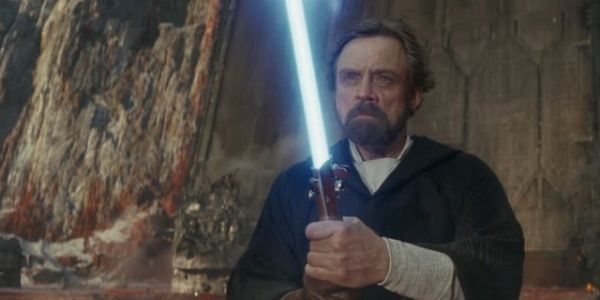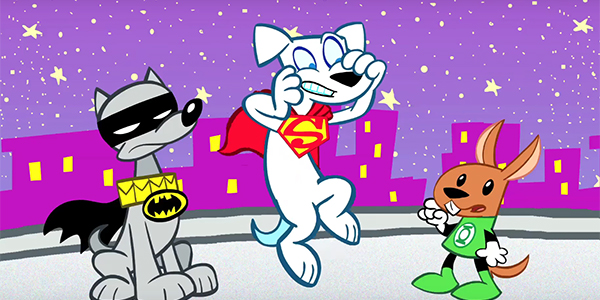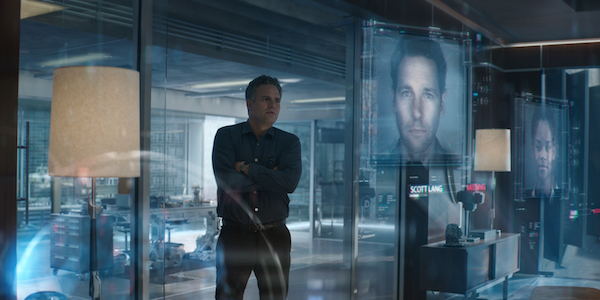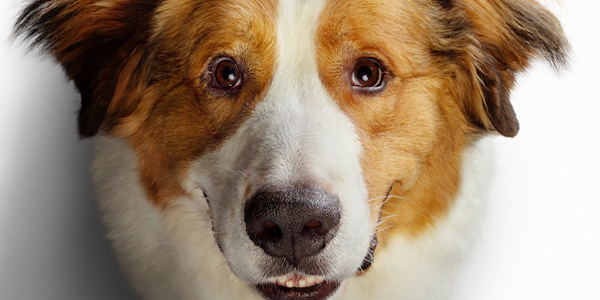How The Guardians Of The Galaxy Movie Characters Compare To Their Comic Counterparts
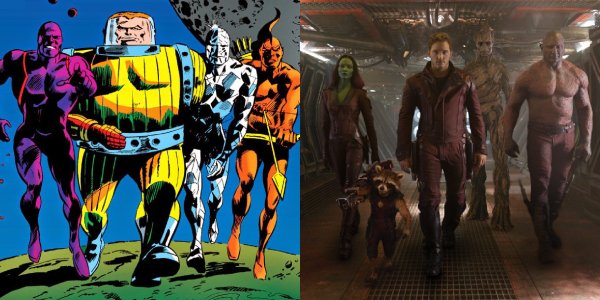
The comic book movie genre was forever changed by Christopher Nolan when The Dark Knight convinced Hollywood to take superheroes seriously. That was until the comic book movie was revolutionized again six years later by James Gunn when Guardians of the Galaxy, starring then sitcom star Chris Pratt, convinced Hollywood to take superheroes less seriously again.
The planet-hopping, ‘70s pop hit-blasting, sarcasm-quipping heroes of the Marvel Cinematic Universe changed the superhero movie game as soon as we saw Chris Pratt’s Peter Quill (sorry, “Star-Lord”) jamming to Redbone’s “Come and Get Your Love” at the beginning of 2014’s Guardians of the Galaxy. The funny thing is, despite becoming one of the most beloved groups of comic book movie characters in history, their source material is among Marvel’s most obscure and unrecognizable properties. In fact, if you ask a true fan of the comic’s original run, Star-Lord, Gamora, Groot, and company don’t look familiar.
In order to immerse yourself in the world of the Guardians of the Galaxy, first, you must forget everything you know about the refreshing sci-fi/comedy combo Guardians of the Galaxy (sorry, Chris Pratt fans) and go all the way back to even before Blue Swede released “Hooked on a Feeling,” when Marvel first introduced a group of ragtag cosmic warriors.
Guardians of The Galaxy (1969 comic book lineup):
In the deepest reaches of space in the 31st century, a group of lone fighters, each the last of their own species and with vengeance in their hearts, must unite to defend the Earth solar system from the evil alien race the Badoon. They call themselves the Guardians of the Galaxy. Their names are Major Vance Astro, Martinex T’Naga, Charlie-27, and Yondu Udonta.
While you probably recognize one of those names from the MCU, the others probably have you scratching your head. The truth is that when the Guardians of the Galaxy first appeared in Marvel Super-Heroes #18 in January 1969, they were nothing like who their mainstream identities eventually became. Even the initial concept that inspired them was wildly different from the final product.
Guardians co-creator Roy Thomas had the idea of superhuman guerilla soldiers fighting against the Russian and Chinese armies in a wartorn United States, but after discussion with fellow writer Arnold Drake and Marvel Comics editor-in-chief Stan Lee, it evolved into an interplanetary adventure instead. Drake, with help from Lee, came up with the characters, who would get their own series years after their first introduction and were used infrequently in other Marvel works throughout the 1970s and 80s, gaining additional members Starhawk, Aleta Ogord, Nikki, Mainframe, and more.
While many of these characters would later be referenced in a post-credits scene in Guardians of the Galaxy Vol. 2, James Gunn’s film adaptation of the characters for the MCU focused on the 2008 relaunch of the series, using cosmic Marvel comic staples such as Peter Quill, Gamora, Rocket Raccoon, and other notable characters. Yet, even the characters in the films are essentially just shadows of their comic book counterparts. How do the Guardians of the Galaxy Vol. 1 and their sequel characters compare to their original inception?
Guardians of the Galaxy (2014-present movie lineup)
Peter Quill (Star-Lord)
The leader of the Guardians of the Galaxy, Peter Quill (or, as he might prefer you to call him, "Star-Lord"), has a tragic backstory as a boy who was abducted by space pirates seconds after his mother died from cancer, but who still manages to enjoy the interplanetary life whilst donning a red leather duster and nano-tech face mask, blasting enemies with dual hand cannons, and rocking out to the Jackson 5. While the comic book character who inspired the MCU's introduction still has the mask, the blasters, and the charm, much about Chris Pratt's Star-Lord is the design of writer and director James Gunn.
Created by Steve Englehart and Steven Gan in 1976, Peter Quill was born in Colorado (not Missouri - that was St. Louis-native James Gunn's own personal home state shoutout) to human mother Meredith Quill and alien father J'Son, the then-heroic heir to an intergalactic empire whose ship crash-landed on Earth when he met Meredith. Quill's parentage is amended slightly in Guardians of the Galaxy Vol. 2 with his father revealed to be Ego The Living Planet (portrayed in human form as Kurt Russell), whose comic book background is another story entirely.
In the comics, Quill is orphaned at 10 years old after his mother is murdered by two soliders of the Badoon race seeking to end J'Son bloodline. Quill kills them before they reach him and he is later placed in an orphanage before growing up to become as astronaut. On a NASA mission, his ship malfunctions and he becomes stranded in the unknown reaches of space, where Yondu Odonta and the Ravagers save him and make him one of their own. He would later go on to become an interplanetary policeman and then form the 2008 version of the Guardians of the Galaxy that served as inspiration for James Gunn’s 2014 film adaptation.
Chris Pratt's interpretation of Star-Lord, despite being half-celestial, is still a relatively grounded human being whose skills do not stretch much farther than piloting, marksmanship, and '80s movie trivia. In the comics, however, Peter Quill, has telepathic abilities that allow him to communicate with Ship, a sentient energy source that primarily takes the form of his spaceship, hence the name. Of course, in the movie, Quill refers to his purely mechanical mode of transportation as the Milano, another nostalgic Easter Egg from James Gunn, referencing Quill’s childhood crush, Alyssa Milano from Who’s The Boss?
Gamora
As far as base characteristics go, James Gunn's Guardians of the Galaxy got Gamora (Zoe Saldana) pretty much exactly right. Created by Jim Starlin and first appearing in Marvel's Strange Tales series in 1975, she is the adopted daughter of Thanos, the last of the green-skinned Zen-Whoberis, and is, unquestionably, the most dangerous woman in the universe.
Her life on the side of heroism stretches further than her team-up with the Guardians in the 2008 comic book reboot, however. For one, she first attempted to betray Thanos just in her teens before later working as an assassin with the intent to avenge the genocide of her planet, becoming a key member in the battle for the Infinity Gauntlet, and even battling an earlier version of Drax the Destroyer at one point.
We should also mention not to bother looking to the comics for deeper insight into Gamora and Star-Lord’s romance. While their linked counterparts have a strong professional bond, that’s pretty much as far as it goes. Her most notable love interests have been space cop Richard Rider of the Nova Corps and Adam Warlock, with whom she adopted a daughter, Atleza. While neither of those characters have yet to be properly introduced into the Marvel Cinematic Universe, the comics have seen Gamora hooking up with Tony Stark once. Yeah.
Apparently it is also a trend in the comics for her to die over and over and over again, and each time she is resurrected is only temporary until she bites the dust again. With this in mind, we have a few interesting theories about Guardians of the Galaxy Vol. 3.
Drax the Destroyer
Wrestler Dave Bautista made his star-making performance as Drax, the Guardians of the Galaxy favorite whose inability to pick up on sarcasm is made up by his imposing physicality and fierce skills in hand-to-hand combat (excluding placing his finger on his enemy's throat). Of course, Drax's backstory in James Gunn's reimagining is also one of tragedy, having sworn revenge for the baddies killing his wife and child, but the comics gave him a similar, yet much darker, origin.
Marvel writer Jim Starlin introduced in a 1973 issues of The Invincible Iron Man the character of Arthur Douglas, a human being from Burbank, California, who was killed along with his wife by Thanos, who took Douglas’ daughter as his own. A being named Kronos was in need of a fighter to take on Thanos, so he took the vengeful spirit of Douglas and melded it with a powerful body of his creation. Thus, Drax the Destroyer was born with the sole purpose to kill Thanos.
During the character’s run through Marvel’s Silver Age, Drax was also blessed with powers he no longer has, including flight, the psychic ability to detect Thanos from far away, and cosmic concussive blasts that emit from his hands. Maybe that would have come in handy against the Abilisk in the opening of Guardians of the Galaxy Vol. 2. His skin also has a green tint, as opposed to the bluish-gray paint that covers Dave Bautista’s body in the film adaptations. Perhaps that helps Zoe Saldana’ Gamora stand out better, not that she needed much help in that area if we are being honest.
Groot
At the time, there was no moment in the Marvel Cinematic Universe more heartbreaking than Groot sacrificing his life for his new family in the third act of the first Guardians of the Galaxy. How could you not feel an emotional attachment to the kindhearted tree-like creature who is, arguably, the best role of Vin Diesel's career? What if I told you that when Groot first graced the pages of Marvel comics, he was the last creature you would want to cross?
Groot comes from Planet X, home to the Flora colossi: a species of tree-like beings whose rough larynges makes their language almost impossible to understand, as if they are repeating “I am Groot” over and over. Now, that part is certainly true to James Gunn's film. But, he was originally introduced in 1960 in Marvel's Tales to Astonish as a villain who invaded Earth to capture humans for experimentation in the Tales to Astonish series, not to mention he was a monstrous 25 feet tall as opposed to 9 feet in Guardians of the Galaxy Vol. 1. Yikes.
Groot would not be reintroduced as the heroic, friendly charmer we know him as today until 2006 in the “Annihilation: Conquest” storyline, which would later spin off into the modern day incarnation of Guardians of the Galaxy in 2008. Thank God for that, otherwise "I Am Groot" takes on a whole new meaning.
Rocket Raccoon
No one expected (heck, we all laughed at the idea) that a talking, gun-toting raccoon would be a key player in some of the most important battles of the universe (see Avengers: Endgame), but Bradley Cooper's voice and Sean Gunn's motion capture performance gave Rocket Raccoon just the right amount personality in Guardians of the Galaxy to be able to take him seriously. In fact, Rocket could get his own movie and it would probably be just as good as anything James Gunn has given us so far. He has already proven himself worthy as a loner when you look at his comic book history.
If you thought Rocket Raccoon's name sounded a little too much like a Beatles reference, it is not be by accident. Even his origins are inspired by “Rocky Raccoon,” a song off of The White Album, given that the title of one of his first comic book appearances, in The Incredible Hulk #271 in 1982 (“Now Somewhere In the Black Holes of Sirius Major There Lived a Young Boy Named Rocket Raccoon”), references the lyrics. Later, in the mid-1980s, Marvel published a four-issue limited series with Rocket as the central character of his own before becoming a member of the relaunched Guardians of the Galaxy in 2008. It was even Rocket who recommended the name, having once heard it mentioned by founding member Major Vance Astro.
The differences between Rocket cinematic persona and comic book persona are subtle. He is still the same badmouthing expert strategist and tactician, but instead of being born a talking, anthropomorphic animal, James Gunn reimagined him as a creature of unknown origin whose current form as the furry woodland creature is the result of years of experimentation. Pretty dark for being referred to as "Avengers Light" for a while, huh?
Nebula
When we first met the cybernetic Nebula, played by the unrecognizable Karen Gillan in an uncomfortable amount of makeup and prosthetics in Guardians of the Galaxy, she was an ally to Ronan who we loved to hate, but from the end of Guardians of the Galaxy Vol. 2 to her contribution to Avengers: Endgame, we saw her as a tortured soul, seeking redemption and earning our sympathies. Even if she can still be a bit of "Blue Meanie," we can't really blame her, given her bleak upbringing as Thanos' adopted daughter. In fact, James Gunn's reimagining of Nebula's origin is even darker than the comics.
Created by Roger Stern and John Buscema, Nebula was first introduced in the 1980s as a ruthless, Luphomoid space pirate and mercenary under Thanos’ command. She would eventually take on many key players from the Marvel Universe, from The Avengers (whose series she debuted in) to the Skrull Empire. At one point, she became lucky enough to wield the Infinity Gauntlet herself.
Her origins as a half-cyborg differ from the comics too. When Nebula claims to be Thanos' granddaughter, he is offended by this and replaces most of her body with mechanical parts before officially claiming her as his own creation. In the Guardians of the Galaxy films, we learn that, while Nebula was growing up, Thanos replaced one part of her body with a new robotic device, one by one, as punishment each time she was defeated by Gamora in battle practice. And you thought high school was the worst nightmare a teen could face.
Mantis
She may have the very unique and intriguing ability to emulate or manipulate feelings, but Mantis did not seem to be the likeliest choice as a new member of the team when she first appeared as Ego's companion in Guardians of the Galaxy Vol. 2, played by Pom Klementieff. Fans fell in love with her endearing charm and child-like innocence, but compared to the rest of the crew, I would never have expected her to contribute much to the battlefield. More surprising is discovering that Mantis is, just about, the most watered-down character in James Gunn's reimagining.
Born on Earth and of half-Vietnamese and half-German descent, Mantis was abandoned by her father in a section of Earth belonging to the Kree. Believing her to be the Celestial Madonna (think cosmic Virgin Mary), the Kree trained her in martial arts, which eventually earned her a spot with the Avengers (her first appearance in 1973) and later among the modern incarnation of the Guardians of the Galaxy characters.
For someone whose storyline was condensed in the movies, essentially, to “I touch people and feel how they feel,” Mantis has a swelling history in the comics. You could practically call her the Forrest Gump of the Marvel Universe. Hopefully, Gunn is taking note of this for Guardians of the Galaxy Vol. 3.
Yondu Udonta
We know him as a no-nonsense space pirate, Star-Lord's true "daddy," and, most importantly, "Mary Poppins, ya'll!" But the Yondu Udonta of the Guardians of the Galaxy films is a pretty far cry from his noble savage comic book persona, other than being blue.
Yondu, a 31st-century being, debuted as the last of the Centurian species and a founding member of the aforementioned original Guardians of the Galaxy in 1969. Since he was not part of the current incarnation of Guardians of the Galaxy characters, James Gunn figured out how to work him into the story as a Ravager leader with a country-fried accent, courtesy of actor and friend to Gunn, Michael Rooker.
Remember that punk rock mohawk head fin he wore throughout the second half of Guardians of the Galaxy Vol. 2 that was referred to as a “prototype”? To comic book purists, that was the “true” fin, as it was Yondu’s own natural appendage in the original incarnation. In the films, Yondu uses the fin to control his floating arrow, a reference to his comic book counterpart’s skills with a bow and arrow. Of course, the MCU already had an archer, so that explains that.
James Gunn's vision of Marvel's cosmic avengers may be an exciting, colorful, ticklish nostalgia trip, but how much deeper the world of Guardians of the Galaxy goes in ink only makes us more excited to see what references and other surprises are in store for Guardians of the Galaxy Vol. 3. With that in mind, check back with CinemaBlend for more updates.
